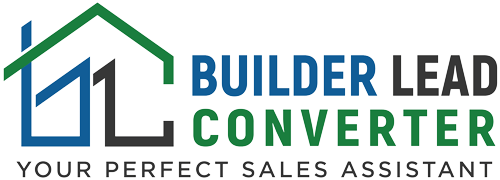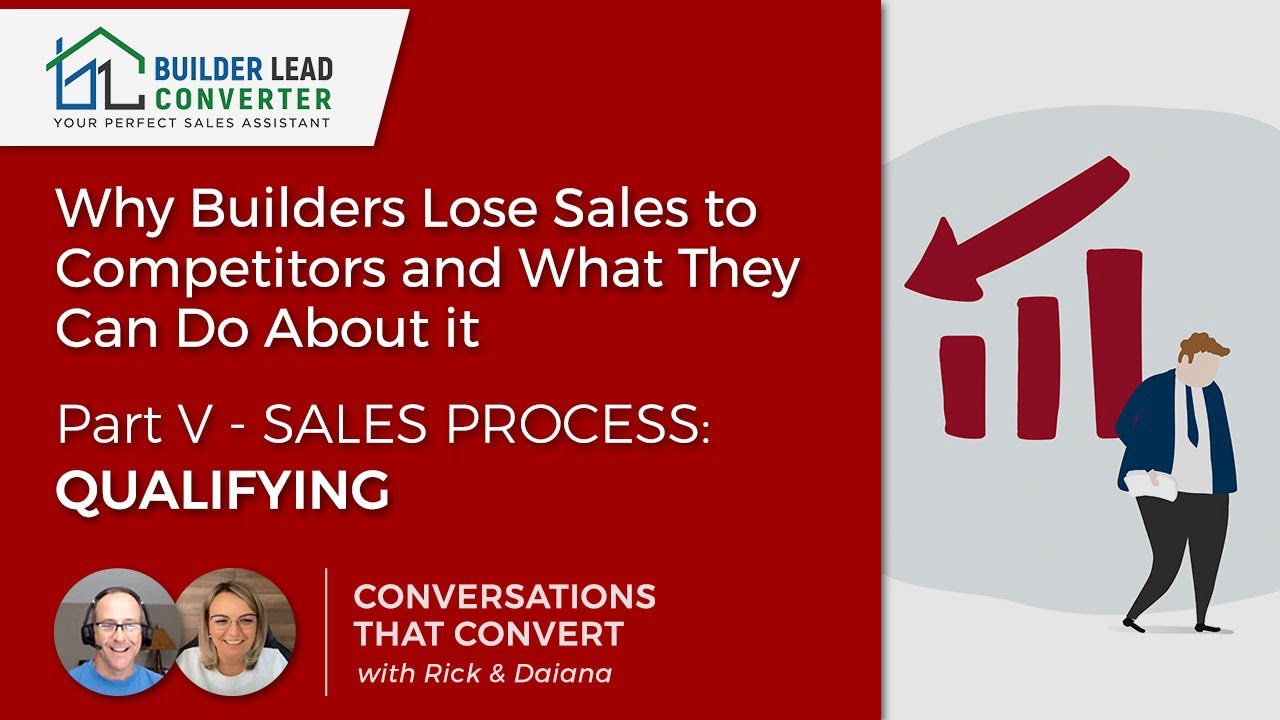Ready to boost your sales and outshine your competition? It’s time to examine your sales process and figure out why you may be losing valuable leads.
In this episode of our series “Why Home Builders Lose Sales to Competitors and What They Can Do About It”, we’ll dive into the art of lead qualification and how you can refine your sales strategy for maximum results.
Join us for a comprehensive discussion on mastering phone qualification. By tweaking your technique, you’ll see your conversion rates soar.
Read/Watch/Listen to this episode. It’s time to sharpen your sales skills and become unstoppable in the industry!
Builder Lead Converter ATTRACTS, CAPTURES & CONVERTS high-quality leads for builders so they can pick & choose their clients & jobs. Find out how at https://www.builderleadconverter.com
Transcript:
Rick: Today In Conversations That Convert, we will be talking about why home builders lose sales and what they can do about it. We’ll specifically be getting into the sales process and qualifying on the phone. Let’s get started.
Daiana: Welcome to Conversations That Convert. Every week, we’ll spend about 10 to 15 minutes tackling relevant lead generation, marketing and sales topics for remodelers, home improvement companies, and home builders. Conversations That Convert is brought to you by Builder, lead Converter, your perfect sales assistant, and now here’s Rick and Daiana.
Rick: Welcome to Conversations That Convert. Hello everyone and thank you so much for joining us, Daiana, welcome.
Daiana: Welcome, welcome everybody. And looking forward to our session today with conversations that can convert leads into sales.
Rick: So what are we talking about today, Daiana?
Daiana: Today it’s a part five sales process. It’s qualifying, and this is part of our Why Home Builders lose sales to competitors and what they can do about it? So,
Rick: Exactly.
Daiana: Process.
Rick: The series that we are in, why Builders Lose Sales. Last week we talked about remodelers and what goes wrong during the qualifying process of remodelers. This week, we will talk about home builders and what goes wrong with the qualifying process during that time. So let’s set the stage, shall we, Daiana?
Daiana: Yes. Let’s go ahead and get started.
Rick: You’ve converted a lead into a phone appointment. The question is now, what? So, we’re gonna have a conversation on the phone. And, the really important thing here is that when you have this conversation, we need to make sure we’re gathering the right information so we know if we should move them into our sales process.
Or should we politely decline and say, Hey, maybe we’re not the best fit? I remember that we’re always looking to say no. That’s the most important thing here to say, this is not the right fit. Let’s not move, move forward. So let’s break down what this sales process looks like.
We did this last week for modeling. Very similar for design build a home building with of course the difference of being in step three. So we, so we’ll do our phone qualification, then we’ll have our initial consultation. So normally the initial consultation, instead of being at the client’s home, will be coming to your office.
Or perhaps if you have a model home or a spec home, you’ll be meeting there. After that, a lot of times you will go on and do some sort of a lot review. So whether it’s land that they already own, whether it’s land that they’re considering purchasing or land that you may have an inventory or you have access to, you’d be walking that land with them trying to, you know, rough stake or put that home, prospective home on that property.
Then we do a proposal preparation agreement and our design agreement. So that’ll bring us into the estimating phase. We build the scope of work, we start on concept plans. The key point here, this is two different agreements, not one, I suppose you could make it one, but you’ll be collecting two different fees.
One for design and then one for proposal preparation. And then lastly, of course, we get to our construction contract. So five steps again. But we have some land we have to look at, and of course, that will affect how we qualify. So any thoughts from you, Daiana, on any of this?
Daiana: Yes. Actually, I have a question. Any curiosity. So let’s say after the phone qualification or initial consult, you decide, okay, I don’t want to work with that. So how you say, look, I don’t want to work with you. So you are, how do you say that to your client? Let’s stop here. And, then, yeah. Go to your…
Rick: That date, right? You have, you, you like, the date doesn’t go well. Like, well, how, what do I tell this person? Do you know? Tell them very politely maybe we’re not the best, the best fit.
Daiana: It’s, it’s me, it’s you, right?
Rick: Exactly. It’s, it’s me. Really. It’s not, you have anything wrong.
Daiana: Yeah.
Rick: That’s so true. Well I think there’s, there’s two ways to do it. There’s probably a right way, a right way, and a wrong way. So the wrong way is just to say, Hey, Daiana, sorry. You’re not the right fit for us. We don’t build at this price point.
We don’t build in this area. Thanks, but no thanks. And because that’s gonna leave them upset cause they’re gonna feel like they’re ultimately rejected. The right way is to say, you know, Daiana, based on what you’re telling me, There are some things that I don’t feel that we could really provide for you that’s gonna give you a great experience and ultimately an end product. So what I would recommend is to go talk to this builder.
Or sometimes I’ve even gone to people and I’ve say, you know what? I don’t think that home building is really something you should consider. I think you should try to find, a used home that’s already built on the market that you can go buy for whatever the reasons are.
Now, it might be they want to build a location and might be their price point, it might be you know, some sort of criteria that we just can’t do from a home building perspective. So I always wanna, if I say no, I always want to say that we, we would not be able to properly serve you the way that you deserve to be served.
And, that’s what, you’re what you want, what’s a need or important to you. Is really better served by either another builder or perhaps just a completely different product, which I’m gonna call a used house, versus a brand-new home.
That’s a great question though. How do you let ’em down gently? And so, and sometimes we automate this and we’ll just automatically somebody says, I want to be in this location and it’s outside of our client service area. Or they want to be at this price point and it’s a price point we can’t hit. We’ll just say, Hey, we recommend you talk to this builder, or we recommend you go to this
Daiana: Home Builder’s Association and reach out to them and tell ’em what you’re looking for and have a, get a, a referral from, from them.
Daiana: Yeah. Thank you for clarifying. That’s, that’s, that’s very powerful and, and useful in the conversation. I was thinking, hello. How can I say no? I, I, I, I hate you. I don’t want to work.
Rick: Say no, graciously. We have, we had to do it graciously because ultimately yeah, you know, it doesn’t take much for someone to say, go on Google or Facebook and say, Hey, I had a conversation with these guys. They were rude, they rejected me, and they give me a one-star. And now that affects your online reviews.
And, so yeah, there’s a graceful way to do it. And I’ll never leave ’em hanging. I guess that’s the rule though. So there are, so as we get into this qualifying, what I have discovered over the years is that there are really seven areas are categories that we need to qualify, a new home lead.
And we’re gonna go ahead and take a look at those right now, these categories are, you know, based on things that I have learned myself, but also just things that I’ve trained, other trainers or people that I’ve gone to over the years have, have said, Hey, this, this is what you have to find out.
And they’re not in chronological order. So category number one will be located. Ultimately if you’re a home builder, you need to be able to build in that location, or you need to have access to land in that location. So that was, you know, normally my biggest disqualifier is, is location timing is the, the next one.
When do they want to move? Not when they want to get started. But the question I would use, Daiana, is, Daiana, how soon do you wanna be living in and enjoying your new home? Because you always have an idea of like, Hey, I’d like to be moved. I’d like to be enjoyed it by such and such a time.
And you might think it’s a long way away. Like it’s a year away. I’m in no hurry. But I can work backward from there because now I can say, well, it takes us this long to build, this long for permitting in engineering, this long for design this long, for estimating.
And so it may mean that we need to start right away you know, in order, in order to hit that. So that it allows me to create urgency. Now, if I ask you the inverse of that question, Daiana, when do you wanna get started? The default answer that you and every other league give.
Oh, I’m, we’re in no hurry. You know, so it’s, it’s hard for me to create urgency that way. So again, I always begin with the end in my mind and move backward. Price range again, Has it been pre-qualified by a lender? And oftentimes when I’m asking this I’ll say, what’s your budget?
And they’ll say this much. And then I’ll say, have you will you be paying cash or financing? So if they say, I’m, we’re financing, I’ll say, oh, have you been able to meet with a lender to get pre-qualified? Yes or no?
And then I will say, so Daiana, if I were to find a home in the land package and I’ll exceed their budget by maybe 10 or 20%, say, if I were to find out here, is that something that we should, that I should show you, or is this absolutely the highest number?
Because everyone has champagne tastes in a beer budget. Everyone wants the most for the least. That’s just human nature. And oftentimes they will tell you a budget of what. They would like to spend, but not necessarily what they’re willing to spend. So we need to understand that upfront as best we can.
And some people are more forthright with it. Others will keep their cards closer to their best. But again, what I found is the best example is say if I found something, should I show it to you and go about 20% above whatever their price point is?
So if their price point’s 2 million I, I’m gonna go ahead and I’m gonna go up to about 2.4 million. If the price point is 500,000, I’m gonna go up to 600,000, you know, again, so roughly at 10, 20%. Okay, what’s wrong with their current situation?
Again, the whole reason somebody walks into your model or calls you or inquires on your website is simply that there’s something changing in their current life. There’s something that’s different. It’s, it, it, maybe it’s a good thing like, hey, I’m, I’m having children and our family is growing and we need a bigger home.
Maybe it’s a bad thing like a divorce or somebody that’s lost a spouse due to a death. Maybe it’s a job change. Maybe it’s downsizing cuz the kids love the house, but something’s changing. So we need to find out what is wrong with their current situation.
Cause I need to understand that in order to know, is this a healthy motive because sometimes people will come to you and they’ve been in their house for three years and they wanna move again. And so you’re sort of like, why is that?
Well, what I’ve found, Daiana, is a lot of times like people will be having marital problems and they think that buying a new house will solve that. I mean, there are just two things that I’ve, I’ve heard over the years, which is an absolute disaster for marriage problems. I’m gonna have another child that’ll help fix the problems or let’s move.
We’ll, we’ll move and that’ll make things better. No problems travel, you know, so it does not help If it’s not a one-close financing. So we gotta understand what is wrong with our current, what’s the underlying motivation making, making sure that we understand what, what it is that is driving them to wanna make a move and that it’s a good healthy thing.
Research, again, how long have they been considering a new home? And one of the questions we will ask is, have they visited our website and then their hot buttons? Okay, so again, what, you know, move-up buyers, larger growing families are typically the, the best because they’re just literally bursting at the seams.
You know, mama comes in and she’s pregnant and there are two little ones. They’re, they’re, they’re toner and they just, they need a larger home. And so they’re very, they’re very motivated. Moving down is not empty nesters, they’re not as motivated, that’s definitely a long process of working through the emotional attachment to their current home.
Some people just like brand-new. You know, sometimes it’s a better location. Maybe it’s an investment. They’re perceiving it, it’s better to buy than rent or they want to get into a certain area. And then ultimately all hot buttons relate back to lifestyle. And then the seventh area is decision-makers.
So if I have what, what’s called a one-legger, that I learn that from the car industry. So if one person comes but not the other decision maker. I need to understand that and make sure that I don’t go very far into my sales process without both decision-makers being present. Any final thoughts there, Daiana?
Daiana: So what struck me is that problem travels, so I like that. So I will keep that in mind. So…
Rick: Problems travelers.
Daiana: Problem travelers.
Rick: Yep. That’s exact, that’s exactly right. And yeah, sometimes you, you know, you have to almost talk people out of doing something. And I’ve seen that too, where some people dislike the process of building a home and they’ve been in their home for two years and they want to do it again.
And you’re like, why? You, you know? And then ultimately what happens to those people is that wears off and then they fall away. They really, very, very, I don’t think I’ve ever had that happen where somebody just wanted to build again because they wanted to build, they thought it was fun. But after you get into it and then you think about the expense and the energy, no, they’re not, they’re not gonna do it.
Daiana: So it sounds like it becomes a habit to build a home, and then you are bored and you want to get busy without facing your real issues. Then you start a new home and that will keep you busy.
Rick: And I think I’m an addict because I think I’ve built five homes.
Daiana: Wow.
Rick: So I’m trying to count out now how many, how many I’ve built. 1, 2, 3, 4. Yes. I’m in my fifth, the fifth home, that I’ve built.
Daiana: That’s amazing. So you…
Rick: But I think, I think for me, yes, you’re right. It’s, it’s, sometimes it’s, people just enjoy it. And you know what, they’re just looking, it’s kind of a hobby, but it’s, it’s an expensive hobby. And again, they usually are gonna waste your time.
Daiana: Yeah.
Rick: All right, so let’s take a look at some sample questions. And these questions are similar to what we did last week. We’re gonna do a little role play, Daiana and myself. And we will go ahead and, you know, show you again, some things you should be asking, should not be asking, how you ask them are gonna be very important as we go through this, this role play.
All right. Maybe make this a little bit larger. I think everyone should be able to see that. Okay. All right. So again, the lead has booked an appointment with me. I’m, I’m gonna talk to them on the phone and we’re gonna walk through this. Daiana, you will be the guest. I’ll be the salesperson. So I’ll say hello, I’m Rick from ABC Builders.
Daiana: Hi, I’m Daiana called Jane, from my house.
Rick: Well, Daiana, it’s a pleasure to meet you. Daiana, what a cold, windy day today, isn’t it?
Daiana: Yes. It’s, it’s windy and it’s cold. I don’t like it.
Rick: So it sounds like you’re looking for information about home building today, is that right?
Daiana: Yes, I’m an, I’m addicted to building homes, so that’s my seventh home and I want to move forward with someone.
Rick: Well, you’ve got a wonderful prospect. You are for sure. Well, great. I’ll be happy to share some ideas and get you the information you are looking for. Daiana, do you have about 10 minutes to talk about your project?
Daiana: Yes. 10 hours too.
Rick: Oh, well, fantastic. And well in that amount of. I’d like to learn a lot, as much as I can about what you’re looking for and can I ask you a few questions to help me do just that?
Daiana: Sure. Absolutely.
Rick: So as a reminder, everyone, you’re wondering what these are these L six one, L six two, that’s called the law of six. We’re trying to get our leaders to say yes six times, which again, open, helps them open up, it lowers their defenses. And so I’m gonna give better information.
Conversely, if she says no six times, she’s gonna get real defense and she’s not going to want to continue sharing information. So again, this is just a little script I put together when I was training salespeople to say, look, just warm ’em up before you get into the questions.
So now we have this new home lead tracking information and I, I have some specific questions on here, but you are gonna learn different ways to ask these questions. So the first thing that I will do is I will confirm, you know, contact information.
I want to know how did they hear about us. Now, maybe they came through the website. And so I already know they visited the website. If it’s a phone call coming in or perhaps it’s a model home walk-in. I do wanna ask the question. You know, Daiana, have you visited the website? Now, the reason I asked that is that if you go back to the categories that I wanted to learn about, one of ’em is research.
Daiana: Yeah.
Rick: How long have they been researching if they just started? You know, they’re it’s a long-term lead. I’ll take ’em, but it’s not some, it’s somebody they need time to probably process information and do their due diligence. But if they have been on my, our website, if they’ve already been looking at home plans, if they’ve already maybe found a location that they’re interested in or, or an available home, I wanna know that.
So somebody says yes, my follow-up question. Well, Daiana, I’m curious what in particular attracted your attention, cuz that oftentimes will open up their hot button, right there. So, oh, I saw this home, I saw this location. We, you know, I saw that we wanna be in this price point and you guys have something to offer.
I’ll ask them if they were referred to that, thank you sent. Is this for me? I can send out a little thank you note if it was a past. So what style of a new home are you considering? Again, these are just terminology that we used here. You probably have different terminology.
How many bedrooms do you need? How many bathrooms? Location? Okay. Where have they found a home site already? What are the, if they have not, what type of amenities are, are they looking for in their home site? Remember, if you inventory home sites or you know of home sites, we always wanna create a unique selling proposition for every single home site.
So what is unique, special, and different about that home site? In other words, it’s one of one. One, when we would do that and we can match those characteristics to what our leads are looking for, we create urgency. What is their primary reason for moving? Have they been built before?
What was the experience like? What other billers are they considering? Are they also looking at used homes? Now, oftentimes if they have a realtor, they have already looked at used homes. Sometimes that realtor will work against you in that they’ll try to keep showing them used homes, even if the building may be the best for them. Maybe sometimes they’re considering remodeling too.
They have a home to sell and they’re not sure. A lot of people now are, in the US because of the lack of housing supply, and probably in other parts of the world as well. There’s a new terminology out there. Maybe you haven’t heard this, Daiana. It’s called, it’s called moving up in place.
Daiana: Moving up in place.
Rick: Moving up in place. So what they do is, instead of going out and building a new home because they can’t find it, or it’s too expensive, they’ll take their existing home and they will remodel it. They’ll do a big renovation to it, and they will essentially move up, without leaving. So that’s becoming quite, quite popular.
Budget financing. Will they be paying cash or financing? Have they thought about their investment amount? Have they been pre-qualified with a lender? If they are financing, what’s the lender’s name? Contact information. Now here’s where I will get into giving them a budget.
Because I need to give them a budget on the phone so they’re considering the type of homes that they’re considering. What I will do is I will say, well, based on what you’re asking me, based on local multiple listing service data, Based on our last five clients that built homes in these two, our two stories run from here to here.
And maybe that desert doesn’t include land. I mean, based on your situation, it may or may not. Then I’m gonna ask ’em about their current home. Okay. Do you currently own or rent? Will you be selling your current home before you begin building? That is a question you have to ask. It’s a nice way of asking.
Can you financially qualify for your new home without selling your current home? Or do you have to sell your current home in order to start construction on your new home? Is your home on the market? Do you need a CMA? So maybe I have a realtor partner that will help me sell homes.
How many people will be enjoying your new home, you know, if they have children? Okay, how old are the children? Older teenage children are decision-makers, so you gotta keep that in mind. So it’s not, may not just be one or two decision-makers.
Again, I always wanna find out if they’re working with a realtor and if so, what their names are. How long have they been looking at new homes? Okay. I’m looking for somebody that’s been at it three to six months or more than six months, cuz that means that they’re probably farther along in the process and they may already have been, become aware of us.
They see value and, and have established some trust for us. Then I grab the rest of their prospect information, their contact information. If it’s a go, I’ll go ahead and I’ll schedule that initial consult. If they need a CMA, I can put that information here. And again, here’s the lead source where I can score that. If I think that this would be a good project to show for an open house.
Again, location-wise, how far is it from the house? Put any other notes on there. And again, a lot of this stuff now you’re gonna, maybe we’ll type right into a CRM type system. But this has just, been a good sheet for me to make sure that I get all seven categories asked.
I get the information I’m looking for because the ultimate decision that I’m looking for is, is this person viable? Should I move forward with them into the next step of my sales process? Remember, the goal is to say no.
Daiana: Yes.
Rick: I’m trying to say no, I’m trying to break up, but break up gracefully final thoughts, Daiana, from you.
Daiana: So, great learning today. So we, we have a structure for, for home builders and we have a structure for remodeling, so that’s…
Rick: Absolutely.
Daiana: Good.
Rick: Yeah. Similar, similar questions, but different, and obviously with remodeling I don’t have to deal with selling a home. I don’t have to deal with finding land so I can stream, you know, it’s, it’s a faster process to get started where I can get ’em right into a proposal preparation agreement and design home building. Little bit more rig and roll.
Cause I gotta get the financing figured out. I gotta get the land figured out if they don’t have it. And you know, and then we move forward accordingly. I dunno if they’re contingent. I gotta just wait. I, you know, try to, hopefully they’ll list it with a realtor that that I work with that will be loyal to us.
Because again, the challenge with contingencies, and I don’t wanna get on attention here, but that realtor that they list a home with, they want to get paid when on whatever home that, that lead buys. And if that lead contacted me first, And then contacted the realtor second, the realtor now is saying, well, I’m only gonna get paid to sell their home.
I’m gonna miss out on the buy. So they’re gonna work against you to try to find them a used house and say, Hey, don’t build, Daiana. Don’t go through all that work and all that, you know, hassle. Go look at this house. And, I’ve been more than once where I’ve gotten that call on Monday saying, oh, Rick, thanks so much. You’ve been great.
But we did find a home over the weekend, and so we’re not gonna be building and we’re gonna cancel the deal. That’s always a great call, but you’ve been wonderful to work with and we’ll refer you to our friends and family. But yeah, that realtor figured out a way to get paid and we lost the deal because of it.
Daiana: Yeah, that makes sense. So great awareness of where to pay attention to when you are starting a conversation with, the lead.
Rick: Absolutely. Yes. So if you would like to find out how we attract, capture, and convert high-quality leads for builders so they can pick and choose their clients and jobs, just go ahead and click on that link below. We’ll schedule a strategy call.
Be happy to share more of these ideas with you and help you again streamline your sales process so you can grow your revenue and jar and, and revenue and margins, and pick and choose your clients and jobs. Remember saying no is an important thing.
So for my brothers and sisters in Christ made the grace of the Lord Jesus Christ, the love of God, and the fellowship of the Holy Spirit, be with you all, always. We will see you next time on conversations that convert.






Recent Comments